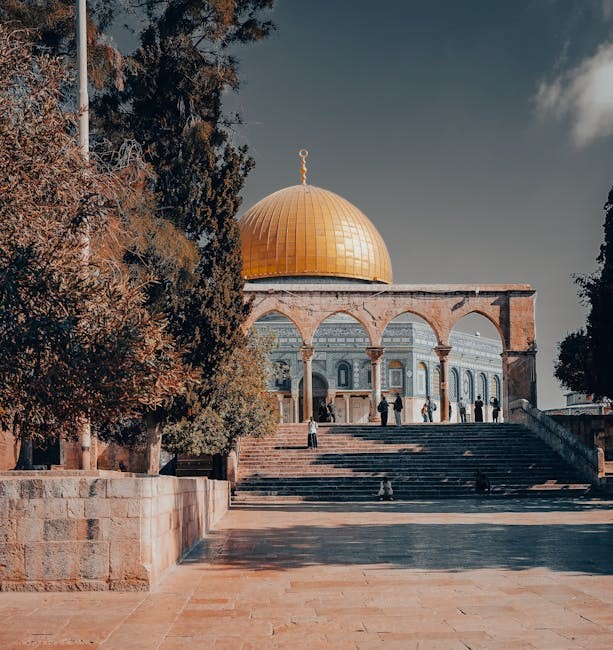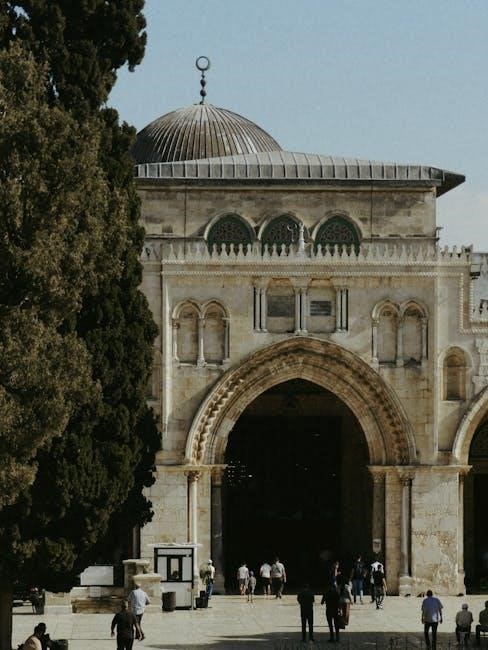
spiritual meaning of the 12 gates of jerusalem pdf
The 12 Gates of Jerusalem symbolize divine access and God’s eternal promises. Representing the 12 tribes of Israel, they embody spiritual transformation and divine government. Crafted from pearls and gold, these gates signify eternal entry into God’s presence, reflecting His completeness and eternal kingdom. They stand as a powerful metaphor for spiritual journeys and eternal access to divine grace;
Overview of the 12 Gates in Biblical Context

The 12 Gates of Jerusalem are deeply rooted in biblical history and prophecy, first mentioned in Nehemiah as part of the reconstructed walls of Jerusalem; In Revelation, these gates symbolize the New Jerusalem, representing eternal access to God’s presence. Each gate is named after one of the 12 tribes of Israel, signifying God’s covenant promises. Crafted from pearls and gold, they reflect divine purity and splendor. The gates are guarded by angels, emphasizing spiritual guardianship and divine order. They serve as a metaphor for transition into new spiritual seasons and encounters with God, highlighting His eternal plan for His people. Their biblical significance underscores themes of restoration, divine government, and eternal access to God’s kingdom.

Historical and Biblical Background of the 12 Gates
The 12 Gates of Jerusalem originated in Nehemiah’s reconstruction of the city walls, symbolizing God’s covenant with Israel. In Revelation, they represent the New Jerusalem, crafted from pearls and gold, with each gate named after one of the 12 tribes of Israel.
The 12 Tribes of Israel and Their Connection to the Gates
The 12 Gates of Jerusalem are deeply connected to the 12 Tribes of Israel, as each gate bears the name of a tribe. This connection symbolizes God’s covenant with Israel and His eternal promises to them. In Revelation, the New Jerusalem’s gates are inscribed with the tribes’ names, representing their foundational role in God’s plan. Historically, the gates in Nehemiah’s reconstruction of Jerusalem also reflected the tribes’ unity and restoration. This connection emphasizes the gates as a symbol of God’s faithfulness and the fulfillment of His divine plan for His people, both collectively and individually.
Biblical References to the Gates in Nehemiah and Revelation
In Nehemiah, the reconstruction of Jerusalem’s walls and gates symbolizes spiritual renewal and God’s restoration plan. Each gate, like the Sheep Gate, represents specific aspects of Israel’s spiritual journey. In Revelation, the New Jerusalem’s 12 gates, each made of a single pearl, signify eternal access to God. These gates, guarded by angels, bear the names of Israel’s tribes, fulfilling ancient promises. Together, these biblical references highlight the gates as transition points from earthly life to divine presence, embodying God’s eternal plan and His people’s unity in His kingdom.
Spiritual Symbolism of the 12 Gates
The 12 Gates symbolize divine transitions and spiritual renewal. Made of pearls and gold, they represent purity and eternal value, marking entry into new spiritual seasons and divine encounters.
The Number 12 in Bible Numerology: Divine Government and Completeness
The number 12 holds profound significance in Bible numerology, symbolizing divine government and completeness. It appears in the 12 tribes of Israel, the 12 apostles, and the 12 gates of Jerusalem, representing God’s structured order. This number signifies His eternal promises and the fullness of His kingdom. The gates, made of pearls and gold, further emphasize purity and divine perfection. In Revelation, the number 12 is linked to the 144,000, representing God’s redeemed people, showcasing His divine government over both heaven and earth. The repetition of 12 underscores completeness and the fulfillment of His plan, reflecting His sovereignty and eternal purpose. This numerical pattern reinforces spiritual truths about God’s kingdom and His people.
The Gates as Transition Points to New Spiritual Seasons
The 12 Gates of Jerusalem symbolize transition points to new spiritual seasons, marking divine encounters and growth. In Genesis 28:17, Jacob’s vision of heaven highlights gates as thresholds to sacred experiences. Each gate, named after a tribe of Israel, represents a step in spiritual progression, reflecting God’s plan for transformation. These gates embody the journey from earthly struggles to heavenly glory, signifying eternal access to divine grace. As believers pass through these spiritual gates, they enter new seasons of faith, aligning with God’s purposes. The gates remind us of His eternal promises and the ultimate fulfillment of His kingdom, where spiritual growth and divine encounters are endless.
The Material and Descriptive Symbolism of the Gates (Pearls and Gold)
The 12 Gates of Jerusalem are described as being made of a single pearl, symbolizing purity, integrity, and great value. The city’s streets, crafted from pure, transparent gold, reflect God’s divine glory and the eternal nature of His kingdom. These materials highlight the gates’ role as entry points to a realm of unparalleled beauty and holiness. Pearls, formed through transformation and endurance, signify spiritual refinement, while gold represents God’s presence and divine light. Together, they embody the eternal and unchanging nature of God’s promises, inviting believers into a realm where His glory reigns supreme. This imagery underscores the gates’ role as thresholds to eternal life and divine splendor.

Theological Significance of the 12 Gates
The 12 Gates symbolize God’s eternal promises and the fulfillment of His kingdom. They represent divine government, completeness, and eternal access to His presence, embodying His unchanging plan.
God’s Eternal Promises and the Fulfillment of His Kingdom
The 12 Gates of Jerusalem are a profound symbol of God’s eternal promises and the ultimate fulfillment of His kingdom. Crafted from pearls and gold, they represent divine completeness and purity. Each gate, inscribed with the names of Israel’s tribes, signifies the restoration of God’s covenant promises. These gates, always open, embody eternal access to His presence, fulfilling the vision of a kingdom where believers from all nations worship together. The gates symbolize the culmination of God’s redemptive plan, where His glory reigns supreme, and His people dwell in harmony under His eternal rule. They stand as a testament to the realization of His kingdom on earth and in heaven.
The Gates as Symbols of Eternal Access to God
The 12 Gates of Jerusalem symbolize eternal access to God, always open to welcome believers into His presence. Crafted from pearls and gold, they represent divine beauty and purity. These gates, inscribed with the names of Israel’s tribes, signify unity and reconciliation, as people from all nations enter together. The absence of a temple in the New Jerusalem underscores direct access to God, unmediated by earthly structures. The gates, always open, reflect Jesus as the ultimate entrance to eternal life. They embody God’s promise of eternal fellowship, where His glory is accessible to all, fulfilling the vision of a kingdom where believers worship together in perpetual communion with Him.
Spiritual Application of the 12 Gates in Christian Life
The 12 Gates guide believers into deeper spiritual life, symbolizing transitions to new seasons of faith. Crafted from pearls and gold, they embody purity and divine completeness, inspiring restoration and growth.
Restoration of Spiritual Discipline and Divine Encounters
The 12 Gates of Jerusalem symbolize the restoration of spiritual discipline and divine encounters. Each gate represents a tribe of Israel, signifying a collective journey toward spiritual renewal. These gates serve as transition points to new seasons of faith and deeper communion with God. They remind believers to return to spiritual practices and seek divine encounters. The imagery of the gates, made of pearls and gold, emphasizes purity and the value of spiritual discipline. Through these gates, individuals and communities find restoration, aligning with God’s plan for their lives and His eternal kingdom. They inspire believers to pursue a life of spiritual growth and intimacy with God.
Prophetic Plan for the Ages and Individual Spiritual Growth
The 12 Gates of Jerusalem embody God’s prophetic plan for humanity, reflecting His divine blueprint for the ages. Each gate, named after a tribe of Israel, signifies a unique aspect of spiritual growth and transformation. They represent a journey through faith, obedience, and divine encounters, guiding individuals toward deeper intimacy with God. The gates symbolize eternal access to His presence, emphasizing the restoration of spiritual discipline and the fulfillment of His kingdom. They inspire believers to align with God’s purpose, embracing their role in His prophetic plan. Through these gates, individuals find spiritual renewal and a path to eternal life, fulfilling their divine destiny in God’s eternal kingdom.
The 12 Gates of Jerusalem hold profound spiritual significance, representing God’s eternal promises and divine government. Symbolizing completeness and eternal access to His presence, these gates inspire believers to embrace spiritual transformation and align with His prophetic plan. Crafted from pearls and gold, they embody the fulfillment of His kingdom, where divine encounters and spiritual growth are paramount. The gates remind us of God’s eternal covenant with Israel and humanity, offering a path to eternal life. They stand as a powerful metaphor for spiritual journeys, guiding individuals toward deeper intimacy with God. Through these gates, we find eternal access to divine grace, fulfilling our role in His eternal kingdom.